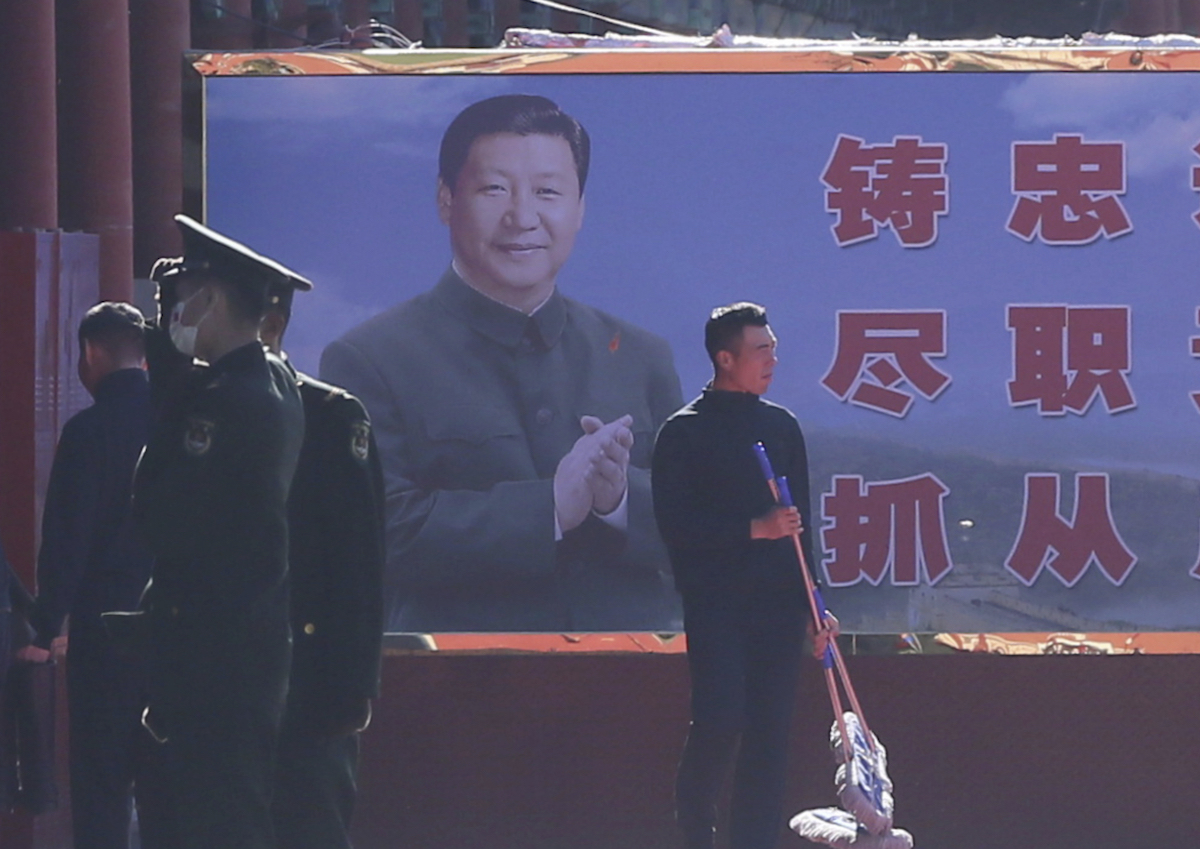China’s Xi Jinping has already served longer than any U.S. president other than Franklin Delano Roosevelt. And Xi is likely to pass FDR in just a couple years. The Chinese president and Chinese Communist Party general secretary has secured the support necessary for a third term—expected to be followed by a fourth and even fifth one, should Xi, currently 68, live long enough.
In mid-November, the CCP Central Committee, made up of nearly 400 regular and alternate members, approved a resolution on the CCP’s “major achievements and historic experiences.” Only the third such measure in the party’s 100-year history, it elevates Xi to the pantheon that heretofore included only Mao Zedong, who led the CCP to victory and ruled until his death in 1976, and Deng Xiaoping, who gained control shortly after Mao’s death and muscled through the economic and social reforms that transformed the People’s Republic of China (PRC).
Xi’s political sanctification process has been ongoing for some time. A few years ago, the CCP enshrined “Xi Jinping Thought” in the constitution, along with that of Mao. Officials were ordered to study the newly sacred word. The latest resolution claims that the PRC has “made historic achievements and undergone historic transformations” under Xi, resolving problems that others could not solve. The measure’s purpose is to prepare for Xi’s third term. According to Victor Shih of the University of California (San Diego): “He wants to really highlight his own contribution to the development of the party, that also will seal his legitimate rule over China in the foreseeable future.”
Xi’s role is presented as moving China forward. Mao, known as the (first) Red Emperor, famously declared that the PRC had “stood up” after “the century of humiliation” at the hands of Western colonial powers. Next, Deng took the anti-Marxian position that the Chinese people should “get rich.” Decades later, Xi shifted China’s direction again, extending CCP authority over nominally private business in the name of creating a fairer economy. (The gelding of Alibaba’s Jack Ma served as a powerful warning to lesser business moguls.) The Chinese leader is offering a broader ongoing program to “get strong.”
To advance his agenda, Xi is rewriting history, as communist leaders are wont to do. The Economist explains: “Mr. Xi’s predecessors used history differently in their resolutions. In 1945 Mao justified a purge of his enemies, blaming them for past mistakes so he could position himself as the unquestioned leader. In 1981 Deng’s resolution said that Mao had made serious mistakes and that the Cultural Revolution of 1966-76 had been a ‘grave blunder,’ causing chaos. By criticizing Mao, albeit cautiously, Deng rebuilt public support for the party and freed his hand to pursue free-market reforms.”
Now Xi is trending a bit closer to Mao, though without the latter’s unpredictable mania for chaos, and away from Deng, though committed to retain the essentials of a market system. What will not change is the PRC’s relentless determination to ignore its terrible totalitarian disasters. Beijing has emerged as a great power because of what Xi refuses to admit: the dramatic dismantlement of Mao’s legacy.
In February the party issued a new historical airbrush. As The Economist describes it: “It touches only briefly on the Cultural Revolution. It does not mention the famine caused by the Great Leap Forward that killed tens of millions, nor any casualties in the crushing of the pro-democracy protests at Tiananmen Square in 1989. The section on Mr. Xi’s tenure takes up more than a quarter of the book. Mr. Xi’s predecessors, Hu Jintao and Jiang Zemin, are given much less space.”
The CCP turned 100 earlier this year. There are four critical phases of Chinese history that the party consistently falsifies. The first is the conduct of the war. The communists were interested in power, not people. Frank Dikötter writes this of the CCP’s military campaign: “To conquer key cities in the industrial northeast, Communist commanders laid siege to civilian populations. ‘Turn Changchun into a city of death,’ proclaimed Lin Biao, one of Mao’s most successful strategists, in 1948. By the time the metropolis fell five terrible months later, 160,000 non-combatants had died of starvation.”
Although Mao proclaimed the new PRC government on October 1, 1949, power still had to be consolidated across the world’s most populous yet largely rural nation. During this time, Dikötter explains, millions were murdered and millions more imprisoned as part of campaigns against “landlords,” “counter-revolutionaries,” and others. Mao was intent on destroying preexisting relationships, writes Dikötter, “so that nothing would stand between the people and the party. … Nobody was to stand on the sidelines. Everybody was to have blood on their hands.”
The next critical period came in 1958, the “Great Leap Forward.” Mao, an intellectual who knew little about farming or commerce, was determined to simultaneously collectivize the former and industrialize the latter. The result was almost beyond description, the Holodomor in Ukraine, only tenfold. The result was ruinous famine, economic failure, and mass starvation. Moreover, communism revealed itself at its worst: a callous, distant party elite, whose members ate and lived well and engaged in social engineering enforced by the power to detain, torture, and execute. Accounts of the time are simultaneously horrifying, mind-numbing, and enraging. Estimates of resulting deaths range up to 46 million.
The final mad Mao campaign was the Great Proletarian Cultural Revolution. This campaign was triggered by his eclipse. Pushed aside after the cataclysmic Great Leap Forward, he forced his way back into power by triggering a furorof ambitious revenge, ideological purification, party purge, social collapse, and civil war. The eternal image of the Cultural Revolution is that of frenzied “Red Guards” waving Mao’s little Red Book, often brutalizing and killing “capitalist roaders” and others deemed to be insufficiently committed to the revolution. Millions, including Liu Shaoqi, the country’s president, whom Mao blamed for pushing the “Great Helmsman” aside, were imprisoned, tortured, and/or murdered. The human horror ended only on Mao’s death in 1976 and the subsequent purge of his chief acolytes, most notably the Gang of Four.
Even though Mao’s political heirs agreed on ending his reign of terror, they bitterly fought for control, during which Deng, oft purged and rehabilitated under Mao, gained predominance. Since Mao could not easily be written out of Chinese history, the CCP pronounced his record to be 70% good, a judgment embodied in the party’s 1981 historical resolution. That for someone responsible for tens of millions of deaths, 65 million according to the Black Book of Communism: Crimes, Terror, Repression. Some estimates go even higher. Yet Mao’s visage currently graces the PRC’s currency, his picture adorns the Gate of Heavenly Peace in Tiananmen Square, and his mausoleum dominates Tiananmen. Although his continued public presence offends many Chinese, Xi has moved Mao closer to his previous saintly status and punished criticism of the communist icon.
The final tragedy airbrushed from Chinese history is the 1989 massacre of protesters demanding political liberalization. Although the students in Tiananmen Square received the greatest attention, the protests were widespread and included workers as well. The outcome was a close-run affair, as Deng ousted two successive party chairmen for being relative liberals. The purge that followed was fearsome, though the China that emerged, while authoritarian, did not return to Maoism. The latter process had to wait another three decades for Xi and his rewrite of Chinese history.
Xi Jinping can manipulate the past, but he cannot control the future. Indeed, opposition to his rebirth as the second Red Emperor has proved sufficient for Xi to denounce his critics. He will not rule forever, and on his departure from office, through retirement, death, or purge, his legacy might be speedily dismantled. With Xi falling far short of Mao or Deng in importance—he has created little more than a personal dictatorship, despite his ostentatious self-adulation—there might be a rush to airbrush “Xi Jinping Thought” out of politics and the constitution. That could revive support for moving toward a more liberal society.

